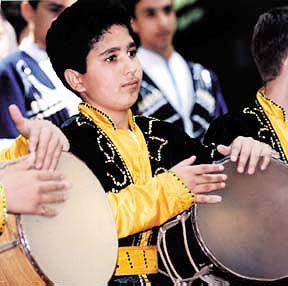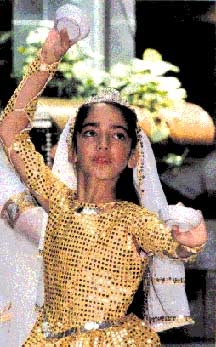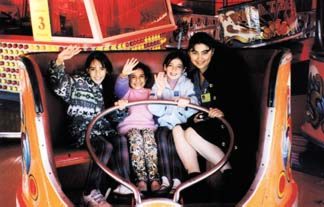|
Autumn 1997 (5.3) Baku Diary by Susan Cornnell Having been away from Baku for more than a year, I expected to see dramatic changes to this city which the Western press now dubs as the "Caspian oil boom city" As always, Baku surprised me. Things have changed quite significantly, in some cases dramatically. But probably what caught my eye the most were ordinary things, so indicative of life in Azerbaijan. I found myself paying a lot of attention to the hands of people and the expressive stories they tell about the way of life in this land. Caring Hands
Hands bear witness to the relationships between husbands and wives. The engagement ring doubles as the wedding ring-a simple gold band worn on the right hand. Not all married people wear them. Gold is a precious commodity in Azerbaijan so you're likely to see costume jewelry or no rings at all. Rings with large diamonds or precious stones are rarely seen in public. At least, not these days. Hands are also used for reaching out and touching friends. When I first arrived in Baku in 1992, I was surprised how frequently Azerbaijani women touched me, held my hand, or patted me on the shoulder or arm. I expected physical affection from close friends, but in Baku, it seemed that even a new friend was an immediate close friend. I found myself being hugged by friends from the first day I met them.
Hands on the Street On the street you'll see hands gesturing and dramatizing a conversation. Hands ask questions. There's one simple hand movement in Baku that seems to ask a myriad of questions. It's the open extended hand, palm up, which "wags" back and forth a couple times. It seeks answers to questions like, "How are you?" or "Where have you been?" "How much does it cost?" "What do you want?" and any similar question in context. Hands cling to handkerchiefs-flowered ones for ladies, striped ones for gentlemen, neatly folded and pressed against the face to wipe away perspiration on a hot, sultry day. Working Hands On the Metro are hands of business people intent on getting to their offices. Men carry briefcases, often with three fingers curled around the handle, and thumb pressed against the case's side as an extra precaution against its sudden opening. Of course, there are plenty of other hands-obviously hard-working, outdoor hands, tanned and a bit gritty under the nails, especially at the end of a long laborious day.
At the homes of Azerbaijani friends, it's a familiar sight watching hands busy preparing meals. It's not unusual for women to flutter about the kitchen all day in anticipation of the event. Hands make sure that hot water is always simmering on the gas to serve tea to visitors and make them feel like royalty. There are relatively few conveniences or appliances in a typical Azerbaijani kitchen. While a typical American cook would push a button on a food processor, here in Azerbaijan, everything is cut by hand. Greens such as scallions, dill and purple basil accompany each meal. Hands carefully wrap grape leaves around rice and meat to stuff "dolmas." They mince garlic for the thick yogurt sauce and heap up piles of rice pilaf onto platters. Capable, highly skilled hands make rich desserts such as "pakhlava" (bakhlava) using honey, nuts and thin layers of pastry. After the meal, hands become rhythmic as the family entertains the honored guest. As the party gathers near the piano to sing and dance, a baby's hands clap together; another child lifts its hands while dancing. A mother's hands are poised over the keyboard to accompany her children in a fun medley. It didn't take me long to realize that music is the national heritage of Azerbaijan. Even the majority of modest apartments have a piano or some sort of traditional music instrument such as a tar (a stringed instrument), garmon (similar to an accordion) or gaval (drum). American Hands While American hands grip steering wheels in grid-locked freeway traffic, Azerbaijani hands clutch plastic bags as they head down the street, walking to work. Of course, that's not to say that Baku doesn't have its own terrible traffic jams as more and more people purchase cars. American hands hold newspapers, but the articles printed on the pages don't describe the effects of war in their own country and the heartbreak of hundreds of thousands displaced fellow countrymen. In America, the hands of children are familiar with keyboards and joysticks of computers and video games. The hands of Azerbaijani children are still used to improvising their own entertainment. American students' hands hold brand new colorful textbooks; in Baku, children are delighted to get the chance to page through a used textbook. Outside of Baku, especially in refugee camps, an entire classroom may have to share a single book or none at all. Hands in Need The seemingly secure "cradle-to-grave"
support system of the Soviet Union collapsed in 1991 when the republics gained
their independence. Ideologies are changing, and people are having
to choose priorities carefully. The new economic system, coupled
with vast riches untapped under the sea, promises prosperity
for all Azerbaijanis in the years to come. The unknown question
is what these same hands
will be doing in the years to come. Everyone is waiting impatiently
to see what fate's hand will deal them. |



